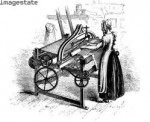Tracing family history is an exciting, fascinating, often frustrating, but thoroughly compulsive activity. It’s a never-ending hobby, because a family tree is never completely finished. There will always be at least one elusive ancestor,  and with the ancestors doubling with every generation, you are never short of lines to research. But as well as going back as far back in time as possible, there is also the fascinating research that can be done into an individual’s or family unit’s background. Once you’ve got the bare bones of your family tree, it is then even more satisfying to dig deeper and find out about your ancestors’ lifestyles.
and with the ancestors doubling with every generation, you are never short of lines to research. But as well as going back as far back in time as possible, there is also the fascinating research that can be done into an individual’s or family unit’s background. Once you’ve got the bare bones of your family tree, it is then even more satisfying to dig deeper and find out about your ancestors’ lifestyles.
The most common resources for genealogical research are BMD records (birth, marriage or death certificates), which in England start in July 1837; census records which start in 1841; and parish registers which began in England in 1538, though not all registers have survived from before the 18th or 17th centuries.
These resources will give you a lot of information about your ancestors’ occupation, where they lived, who they lived with, whether they moved around a lot and perhaps the circumstances of their birth and death. They are also the main sources of information to help you go back in time and find each successive generation.
For many families, particularly where they are mainly of the working and poorer classes (which is the vast majority), these may be the only records where your ancestors’ names are written down.
However, if you are prepared to visit archives, dig around and try to find more obscure documents, there are treasures to be found even for the poorest families.
For example, if your ancestor was poor enough to need parish relief, you may be lucky enough to find a settlement record. These were examinations made to make sure that a person had a legal right to poor relief, and were made particularly when a family moved from one village to another.
Some of these records give very detailed information about the person and his family, and the subject is often asked to make a lengthy statement, which can you much about his character and lifestyle. I once found a very detailed one for a client’s ancestor, which told us that he was ‘natural born’ (illegitimate), and that he had also had a previous marriage, which was something that had not been obvious from the BMD records. It also told us about the amount of bread his family had each week.
Suddenly, the person who had been no more than a name and a date on a page, comes to life. It was no surprise to find that the above person was found to have died in the Workhouse in his 50s, and some of his children took the opportunity to leave the poverty of the area for a new life in Australia.
Newspapers can also be a rich source of information. In the past, newspaper research was useless unless you knew of a specific event as they were not indexed. But now, with the technology of the internet, you can search for individuals on websites where newspapers have been indexed, such as britishnewspaperarchive.co.uk and findmypast.co.uk. Using these indexes I was able to find details of an incident in which a client’s Victorian policeman ancestor had been involved, when he was assaulted by members of a rowdy crowd. This gave my client a little window into her ancestor’s life, and the kind of work that he carried out.
Wills, of course, are another excellent insight into an ancestor’s life, and his relationships with his family and community, especially if they come with an inventory of goods. It is always worth searching for a will, even if your ancestors were not wealthy – though the majority of wills are to be found in the professional and upper classes. I have published a guide to searching wills which you can download for just £1 HERE.
If you are unable to find any documents relating to your ancestor, then there are still ways of finding out how they might have lived from day to day, and what issues, local and national, may have been important to them.
Many parishes have small books or leaflets, available in local bookshops, archives, churches or libraries which will give you a history of the local area. From these you can find specific events that may have happened while your ancestor was living there. What happened during his or her lifetime?
You can also find out what your ancestor might have been doing from day to day in his occupation. The Society of Genealogists regularly publishes books in a series entitled ‘My Ancestor was a…..’ They are full of information and tips for doing further research on occupational records. It is worth finding out whether they have published one about your ancestor’s occupation.
If you know that your ancestor worked for a particular company, you could also try finding out whether the company still exists and if they have researchable archives – or perhaps records have ended up at the local record office.
Whether or not you can find documents that mention your ancestor by name, there are many ways to find out about your ancestors’ lives, so dig deep and you can come up with a creditable account of how they lived from day to day.
If you would like some help with finding out more about your ancestors lives, I now offer a service where I do this research for you. Find out more here…

